

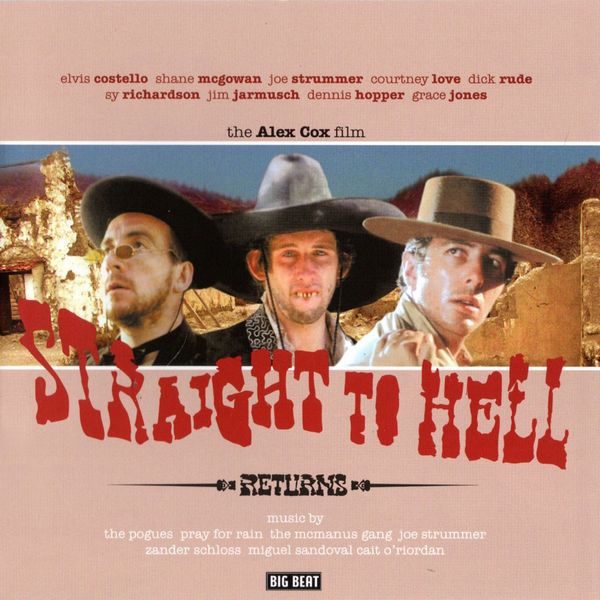
|
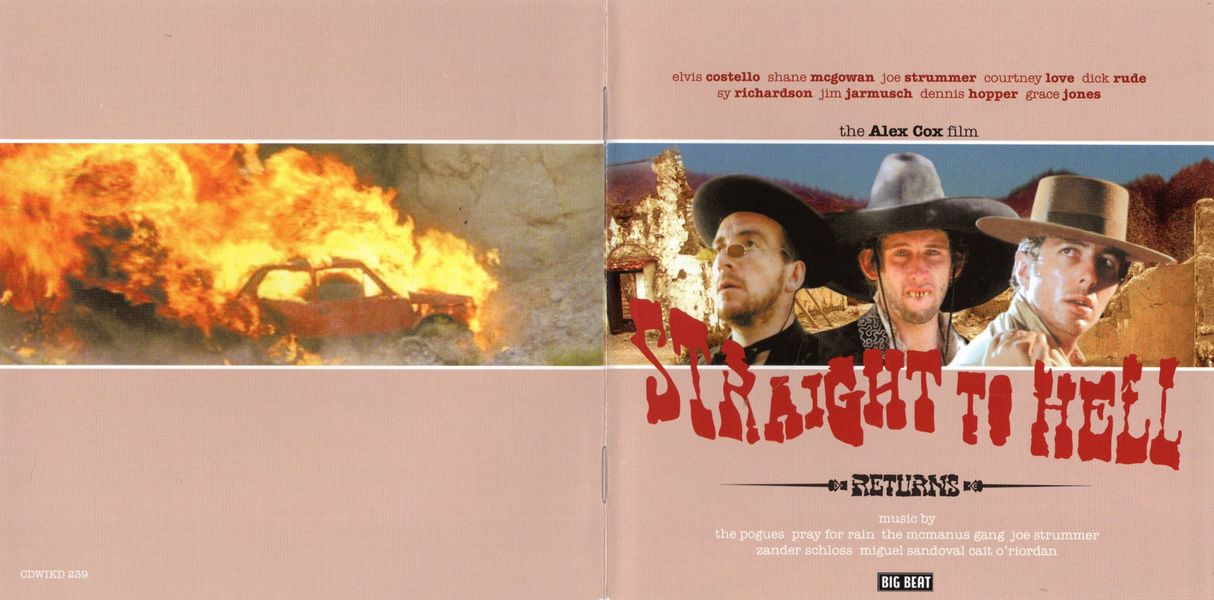
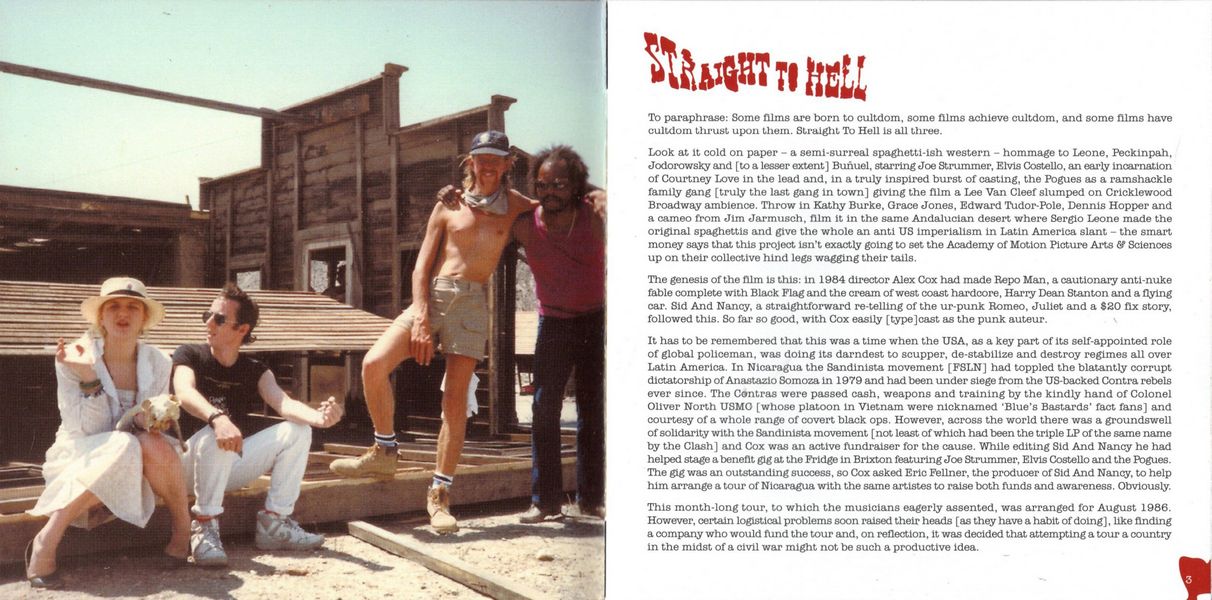 |
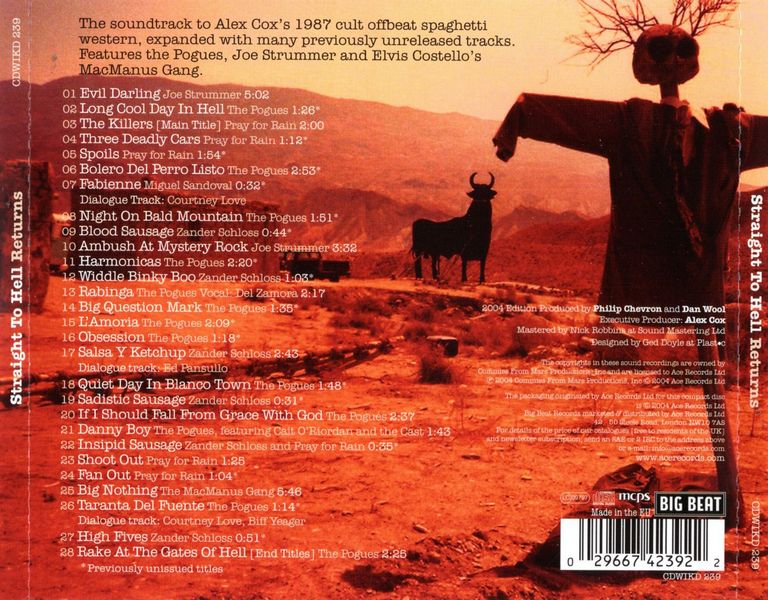
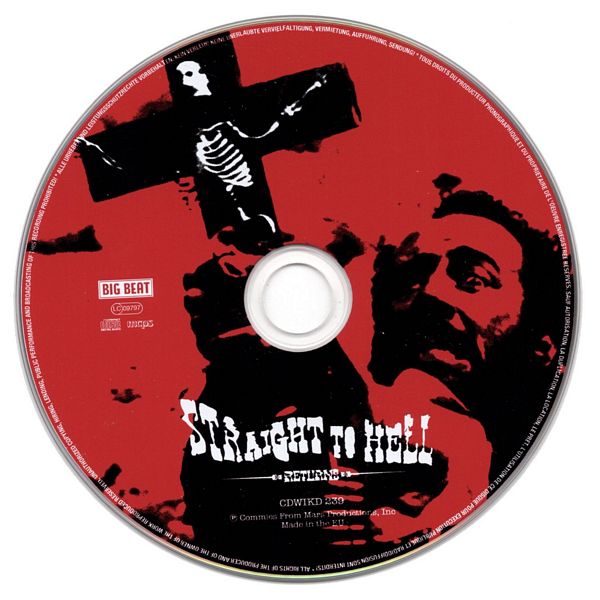 |
| more images |
Sleeve Notes
To paraphrase: Some films are born to cultdom, some films achieve cultdom, and some films have cultdom thrust upon them. Straight To Hell is all three.
Look at it cold on paper — a semi-surreal spaghetti-ish western — hommage to Leone, Peckinpah, Jodorowsky and (to a lesser extent) Buñuel, starring Joe Strummer, Elvis Costello, an early incarnation of Courtney Love in the lead and, in a truly inspired burst of casting, the Pogues as a ramshackle family gang (truly the last gang in town) giving the film a Lee Van Cleef slumped on Cricklewood Broadway ambience. Throw in Kathy Burke, Grace Jones, Edward Tudor-Pole, Dennis Hopper and a cameo from Jim Jarmusch, film it in the same Andalucian desert where Sergio Leone made the original spaghettis and give the whole an anti US imperialism in Latin America slant — the smart money says that this project isn't exactly going to set the Academy of Motion Picture Arts & Sciences up on their collective hind legs wagging their tails.
The genesis of the film is this: in 1984 director Alex Cox had made Repo Man, a cautionary anti-nuke fable complete with Black Flag and the cream of west coast hardcore, Harry Dean Stanton and a flying car. Sid And Nancy, a straightforward re-telling of the ur-punk Romeo, Juliet and a $20 fix story, followed this. So far so good, with Cox easily (type) cast as the punk auteur.
It has to be remembered that this was a time when the USA, as a key part of its self-appointed role of global policeman, was doing its darndest to scupper, de-stabilize and destroy regimes all over Latin America. In Nicaragua the Sandinista movement (FSLN) had toppled the blatantly corrupt dictatorship of Anastazio Somoza in 1979 and had been under siege from the US-backed Contra rebels ever since. The Contras were passed cash, weapons and training by the kindly hand of Colonel Oliver North USMO (whose platoon in Vietnam were nicknamed 'Blue's Bastards' fact fans) and courtesy of a whole range of covert black ops. However, across the world there was a groundswell of solidarity with the Sandinista movement (not least of which had been the triple LP of the same name by the Clash) and Cox was an active fundraiser for the cause. While editing Sid And Nancy he had helped stage a benefit gig at the Fridge in Brixton featuring Joe Strummer, Elvis Costello and the Pogues. The gig was an outstanding success, so Cox asked Eric Fellner, the producer of Sid And Nancy, to help him arrange a tour of Nicaragua with the same artistes to raise both funds and awareness. Obviously.
This month-long tour, to which the musicians eagerly assented, was arranged for August 1986. However, certain logistical problems soon raised their heads (as they have a habit of doing), like finding a company who would fund the tour and, on reflection, it was decided that attempting a tour a country in the midst of a civil war might not be such a productive idea.
The next best thing was, of course, to decamp to Spain with said musicians and make an impressionist spaghetti western with a subtext damning unwarranted US intervention. Paradoxically it would be easier to raise $1 million for a low-budget feature than $75,000 for the tour itself. Put like that it made perfect sense. The process of filming was both a trial (given the heat of the location), and something of a breathing space, Cox's abiding memories of the process are: "Of the great beauty of the desert, and of how quiet and still it suddenly became when shooting stopped, or first thing in the morning. Otherwise it was the usual struggle to wrangle actors (quasi-actors, in some cases) into position and make them attend. In previous films I'd directed scenes with two, or three, or at the most six characters: in HELL I had scenes with twenty characters, all singing and shouting and firing off guns. Which was much better." You still with me? The plot of the film was simple (although some critics denied the very existence of a plot) . Three heist-artists, Norton, Simms and Willy (played by Sy Richardson, Joe Strummer and Dick Rude), double-cross their boss and hole up with Velma (Courtney Love) in Blanco Town, a no-horse burg populated with a motley cast of freaks and ne'er do wells. The town is run by the extensive and unstable McMahon gang (which is where the Pogues and Kathy Burke came in handy) who run on strong coffee and random violence — they also employ the services of a butler, Hives (Elvis Costello) . Initially the strangers are treated with suspicion until their dedication to racking up an impressive body count wins the admiration of the McMahons. All good things must come to an end, however, and nemesis duly arrives. Blood is spilt in copious amounts and, as they say, exeunt omnes.
Simple enough, you might think — a straightforward tale of passion, revenge, incest and java, albeit with some slightly unorthodox touches — a song and dance number here, a song about wieners there (we'll get to that later) . The critics, for the most part, thought differently. Granted, the film wasn't as much in thrall to narrative laws as some but reactions ranged from the sniffy and indifferent to the downright hostile. Veteran American critic Roger Ebert described the film as "An indulgent mess … in need of a coherent plot", ending his review with "Straight To Hell is simply a record of aimless behaviour, of a crowd of pals asked to dress up like cowboys and mill about on a movie set. The way I would like to interpret all of this is, Alex Cox is saving himself for his next film."
The majority of reviewers responded in a similar vein, the general consensus being that the film was a vast in-joke. Only a handful of critics got the point that, perhaps, the film wasn't meant to be that serious. After all, if the object of the exercise is to make a serious piece of genre cinema then it's probably best not to use a cast of musicians with little or no acting experience (even though they manage to acquit themselves well enough) . Cox's response to this general lack of effort was understandably trenchant: "Perhaps it was a little ahead of its time, there was not then a vogue for jokey films about black-suited professional hit men a la Jean-Pier re Melville."
"And there is also an expectation on the part of film critics that a director will follow a certain trajectory. In their hearts critics have this Hollywoodian fantasy: they imagine all directors want to 'graduate' into gigantically budgeted movies full of special effects and petulant stars. But this trajectory is illusory." Indeed, it doesn't take a subscription to Cahiers du Cinema to spot one or two elements of this film popping up in the work of tinsel town's own gazza ladra, Quentin T.
The last word on the film might well be that, true, at times it seems like a collection of vignettes rather than a single narrative and sometimes the action is a little hard to follow but perhaps that's the point. Cox intended the film to have a subtext about US intervention and any examination of (very) recent events, let alone those of 20 or 40 years ago would show even the most hawkish that sometimes, not a lot of thought goes past day one (no disrespect intended to the humble GI, but on a governmental level … couldn't hit a barn from the inside) . In a way it's very much a product of its time — a time when the cultural climate was such that people were less likely to sit on the fence and more likely to go vaulting over it taping clips from an AK-47 together (or at least waving a copy of Socialist Worker), and musicians were (from whatever motive) prepared to roll up their sleeves and get involved.
But anyway, this isn't a reissue of the film, but of the soundtrack. Never before available on CD in the 17 years since the release of the film, and with only half the total music on the vinyl release. It has been expanded, re-jigged and re-mastered by Dan Wool of Pray For Rain and Philip Chevron.
Cox himself left the music, quite sensibly, up to the musicians: "Some of Pray For Rain's music was written before the film was shot, and we played it via a boombox on our set, in homage to the myth that Sergio Leone played Morricone scores to Clint Eastwood and Lee Van Cleef (he didn't!) . Strummer, the Pogues, and Costello all wrote their compositions afterwards, though you could see something was bubbling up while they were seething and suffering in the desert in their black wool suits. I had little to do with the original soundtrack CD, and regretted that much good score wasn't on it. So I confess to goading Dan Wool and Philip Chevron into coming up with Straight To Hell Returns, which contains ALL the soundtrack music, more-or-less in running order."
This release is destined to be greeted as manna from on high by Pogues, Strummer and Costello completists as it contains, as few contemporary soundtracks do, otherwise unavailable (and definitely unavailable until now) performances.
It's Mr Strummer that starts the ball rolling with the tropically laconic 'Evil Darling', now revealed as a pointer toward his latter work with the Mescaleros. Strummer also provides a short Link Wray meets Leone-era Morricone meets John Carpenter instrumental, 'Ambush At Mystery Rock'. Needless to say, much of the music shares the arid landscapes and widescreen dynamic of the classic spaghetti soundtracks. The five Pray For Rain tracks ('The Killers', 'Three Deadly Cars', 'Spoils', 'Shoot Out', 'Fan Out') warp Morricone aesthetics through a Hammersmith Clarendon lens (I think you know what I mean — even if it shows your age) .
Many of the tracks are, by nature of the project, more atmospheric sketches than full-on numbers although it would be wise to draw your attention to the 'Sausage' cycle by Zander Schloss (who plays The Wiener Kid) and Pray For Rain's Dan Wool. They are 'Blood Sausage', 'Sadistic Sausage' and 'Insipid Sausage'. Taken together as a song-cycle they … well, they neatly open and close the chapter on pork products in the big book of rock'n'roll. In a similar vein (or should that be 'skin') is the performed-on-pain-of-death 'Wiener Song' which poignantly hymns the delights of the humble pork tube.
Breakfast staples aside it's the original Pogues/McMahon gang (with Cait O'Riordan, without Philip Chevron) who provide nearly half of the total music on the soundtrack. At this time the Pogues were gradually moving away from the Gresham Ballroom on cheap speed approach of their first two albums and were casting their musical net outside the Irish diaspora. The bulk of their tracks here are full of a scorched, Tex-Mex ambience, with the odd cajun twist and penned, for the most part, by Jem Finer. Also appearing are the soused and damned 'If I Should Fall From Grace With God' and 'Rake At The Gates Of Hell', which come from an altogether more recognizable Pogue-ish angle.
Honourable mention should be made of the stark and plaintive version of 'Danny Boy', led by Cait O'Riordan and joined by the rest of the cast. Cait's voice revisits the fragile but passionate territory of 'I'm A Man You Don't Meet Everyday' from the Pogues' second LP, "Rum, Sodomy And The Lash". Given the group's then-reputation for a fully hands on approach to joie de vivre the song takes on a particularly plaintive last orders tone.
So, there it is — if you know the film you'll have got the point years ago, and if you don't … well you should. High art it may not be but it lives in a special little bubble all its own.
Final word to the maestro. When asked if he'd do the same again, given that the US hasn't exactly cleaned up its act vis-a-vis international relations he replied "Ah, now if you're asking me what I would like to direct, that would be a Foreign Legion story. A lonely outpost in the North African desert, manned by Frenchmen and pioneer women, with American Indians riding around it in circles firing flaming arrows over the parapet. We could use the same set as Straight To Hell, and most of the costumes. I can imagine no greater honour, pleasure, or privilege, than to be reunited with the surviving cast and crew in 110 degree heat, in August, in that same Spanish desert, with a flask of wine, a super 35mm camera, and one thousand howling dervishes galloping towards us, firing flaming arrows."
Peter Redmond
A thousand thanks to Alex Cox for answering certain pertinent questions.
The two year gap between the January 1986 release of the 'Poguetry In Motion' EP and the November 1987 release of 'Fairytale Of New York' was a period of frustration and evolution for the Pogues as a recording act. The tedious legal saga of our transition from the ailing Stiff Records to ZTT/Warners in Europe and Island Records in North America seemed endless, and in all that time, we managed only some peripheral recording projects. One of these, the 'Irish Rover' single with the Dubliners, gave us our first Top 10 hit in the UK.
But if we were deprived of an outlet for the work, the period was nevertheless also characterised by some fertile creativity. As musicians and writers we responded compulsively to our environment and, with the almost constant touring against an ever-changing backdrop, we were rarely far from the next source of stimulation, the next element to be tested against our sound and duly absorbed. And you thought we just hung out in bars with Tom Waits and his mother?
Well, we did that too. But mostly, like all well-travelled groups, we hung out in the bandwagon, the tour bus which, when it was not a sanity-threatening sarcophagus, was a hub of experimentation and musical ambition. It's hard to escape the possibility that between "Rum, Sodomy And The Lash" and "If I Should Fall From Grace With God" there may be a missing Pogues album floating around some parallel universe.
Thank Zeus for Alex Cox then!
Alex, who had directed the promo for 'A Pair Of Brown Eyes', hired us to write some music for his Sid And Nancy movie, including Shane's song 'Haunted', which we cut with Ramones producer Craig Leon as a one-off single for MCA Records. He then booked us, along with Joe Strummer and Elvis Costello, for a four-week Solidarity Tour of Nicaragua. The financial end of that tour collapsed, leaving Cox with a bunch of expensive musos and a blank diary. But Alex is nothing if not resourceful and within days he had instead raised, from Island Records, enough money to make a movie with his rag-tag repertory company. And that is how we found ourselves melting in the desert of southern Spain, near Almeria, in the Mad Dogs and Irishmen days and nights of high Summer 1986.
If there is ever a place to discuss the relative merits of the Pogues as actors (for some reason, I was personally never offered another picture after Straight To Hell) this is not it. In any case, once the novelty of the clapper-board wore off we reverted to form, getting 'splattered' (thank you Kathy Burke) on vino tinto and heading into town to clean out the local Spanish guitar store. If not all the musicians working on this picture were natural actors, certainly the reverse was not true, and the musical atmosphere on and off the Blanco Town location was robust, competitive even. Much of the Straight To Hell score — the pieces written by Dan Wool excepted — seems to have been at least partly written in Spain. With the Pogues' contributions, we further developed our ideas back in London's Elephant Studios with our trusty recording squad of Paul Scully, Dave Jordan and Nick Robbins.
The original Straight To Hell album, released by Stiff in 1987, was more a souvenir than an actual soundtrack recording, which explains why no less than nine Pogues tracks from the film make their public debut on this CD. We always liked these pieces and are delighted they've been released at last.
For the real deal on how it was in Almeria that Summer, though, you have to go to 'Fiesta' on the "If I Should Fall From Grace With God" album. By January 1988, when that album came out, we'd had enough of keeping our stories to ourselves.
Philip Chevron
June 2004
It's been many years but I recall it clearly: "No Dan, you can't come to Almeria. Your job is to stay in San Francisco and compose the score." After contributing music to Alex Cox's first two feature films, Repo Man and Sid And Nancy (also with the Pogues and Joe Strummer), I was trying to convince Alex how invaluable I'd be as an on-set composer for Straight To Hell. He didn't fall for it, and of course with a cast largely made up of rock stars and musicians, by the time the film got back from the Spanish desert, Pray for Rain's work-load had been cut down substantially. But no complaints. Once I saw the list of the heavy-weights on the roster with whom I'd be splitting my residuals, I felt fortunate to have a job at all!
Either Alex got really lucky or he should be given a measure of credit for knowing the strengths and weaknesses of each of the mules on his composing team. One might expect whining, tension and chaos among the creatives in such an arrangement, but I can recollect no such grumbling and the surprisingly cohesive end result can now be heard in its entirety on this 'official' soundtrack cobbled from the respective archives of the Pogues and Pray for Rain, as well as from the original Straight To Hell soundtrack CD.
Of course any liner notes for the Straight To Hell soundtrack would be incomplete if they failed to acknowledge the man who wrote the bible on Italian-Western scores: Maestro Ennio Morricone. Whether they admit it or not, all modern film composers love to quote from that bible but Straight To Hell delivered the perfect excuse to play extensively with the toys Morricone used to transform film score as we know it today. In a strict sense the score for Straight To Hell often works in the opposite direction of the classic Leone-Morricone collaborations. While Morricone's musical jokes and pop-music modernisms often play as counter-point to the austere grit of Leone's version of the old-west, the earnest and careful homage from the collective composers of Straight To Hell serves to bring the anachronistic insanity of Cox's anti-comedy into the realm of the surreal.
Dan Wool